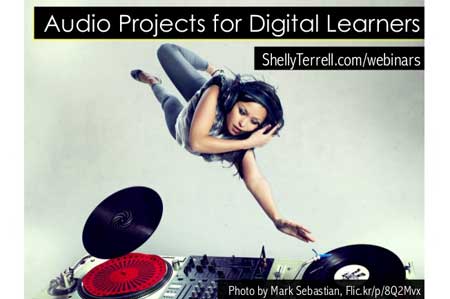Audio Projects for Digital Learners: 30+ Resources

Tools and ideas to transform education. Sign up below.
You are now subscribed
Your newsletter sign-up was successful
“Radio is the most intimate and socially personal medium in the world.” – Harry von Zell
One of the safest ways to integrate technology is to get students to record their thoughts, ideas, or learning with web tools and mobile apps. Students can create podcasts, host radio shows, broadcast the news, make a radio drama, post reviews, add sports commentary, deliver announcements, animate a pet or object, and much more! Students can create audio projects for any subject, such as math, science, history, and literature. In my digital book, Learning to Go, find editable handouts and rubrics for creating audio projects. Additionally, find some ideas and tips below along with downloadable slides to get your students creating audio projects.
Enjoyed these resources? Get your copy of The 30 Goals for Teachers or Learning to Go.
Audio Projects for Digital Learners from Shelly Sanchez Terrell
- Begin by getting students to evaluate and analyze podcasts and broadcasts. This way students understand how broadcasters change their tone, summarize the news and engage their audience. Find short historical broadcasts at Otr.com/news.html. Readwritethink has various audio evaluation interactives with printable handouts. Just search audio, radio or podcasts to access them. Find educational podcasts, some student created podcasts as well, at American Art Podcasts, Digital Podcasts, and the Podcast Directory.
- You could also have students listen to segments of popular mainstream podcasts. Some of my favorites with science, history and math topics include, Radio Lab, Serial, Invisibilia, the TedTalk Hour, and This American Life. Please listen to these podcasts first, because some are not suitable for young students.
- After this initial evaluation, your students will generally need to take these steps to produce their audio projects- brainstorm, research, write a script, edit the script, record it, remix it, edit it, and broadcast it.
- At the brainstorming stage, students decide the topic and identify where to gather more insight.
- At the research stage, students gather insight from various sources. The focus should be on primary resources, which is why I like to have students conduct audio interviews. Give them time to identify who to interview or locations where they can contact professionals for Skype or telephone interviews. Storycorps has several audio interviews and provides great information on creating appropriate questions and conducting research.
- Edit and remix audio projects with tools like Garageband, Audacity, Soundation and WavePad for the iPad.
- Students can find free creative commons music and sounds to use for their audio projects at CCMixter, Freesound, and SoundBible. Find additional resources about Creative Commons and sources for CC images and sound clips in my bookmarks here!
- Broadcast and publish their audio projects with tools and apps, like Audioboo, iPadio, Podomatic, Soundcloud, Spreaker, and the Bam Radio Network.
- Some other useful tools and apps for recording audio and doing quick projects include Vocaroo to easily record from the web without registering or an email address, Talking Ben & Tom News iOS & Android app, YakIt for Kids iOS app, Chatterpix Kids iOS app, Adobe Voice iOS/iPad app, Tell About This iOS app, Buncee Pro iOS iPad app (not Buncee Bits), Tellagami, Voxer, Sock Puppets, Narrable, Voicethread, Prezi, Spoken, and 30 Hands.
Challenge
Check out these tools and apps and plan an audio project for your students.
Bookmarks
Find tons of free apps, handouts, and more by clicking on the bookmarks below.
Podcasts & Audio Projects, by shellyterrell
Tools and ideas to transform education. Sign up below.
cross posted at teacherrebootcamp.com
Shelly Terrell is an education consultant, technology trainer, and author. Read more at teacherrebootcamp.com.
Shelly Terrell is an education consultant, technology trainer, and author. Read more at teacherrebootcamp.com
